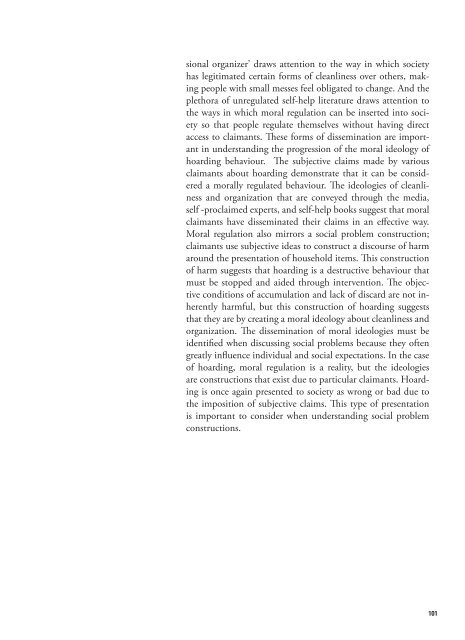Publication (142 pages).
You also want an ePaper? Increase the reach of your titles
YUMPU automatically turns print PDFs into web optimized ePapers that Google loves.
sional organizer’ draws attention to the way in which society<br />
has legitimated certain forms of cleanliness over others, making<br />
people with small messes feel obligated to change. And the<br />
plethora of unregulated self-help literature draws attention to<br />
the ways in which moral regulation can be inserted into society<br />
so that people regulate themselves without having direct<br />
access to claimants. These forms of dissemination are important<br />
in understanding the progression of the moral ideology of<br />
hoarding behaviour. The subjective claims made by various<br />
claimants about hoarding demonstrate that it can be considered<br />
a morally regulated behaviour. The ideologies of cleanliness<br />
and organization that are conveyed through the media,<br />
self -proclaimed experts, and self-help books suggest that moral<br />
claimants have disseminated their claims in an effective way.<br />
Moral regulation also mirrors a social problem construction;<br />
claimants use subjective ideas to construct a discourse of harm<br />
around the presentation of household items. This construction<br />
of harm suggests that hoarding is a destructive behaviour that<br />
must be stopped and aided through intervention. The objective<br />
conditions of accumulation and lack of discard are not inherently<br />
harmful, but this construction of hoarding suggests<br />
that they are by creating a moral ideology about cleanliness and<br />
organization. The dissemination of moral ideologies must be<br />
identified when discussing social problems because they often<br />
greatly influence individual and social expectations. In the case<br />
of hoarding, moral regulation is a reality, but the ideologies<br />
are constructions that exist due to particular claimants. Hoarding<br />
is once again presented to society as wrong or bad due to<br />
the imposition of subjective claims. This type of presentation<br />
is important to consider when understanding social problem<br />
constructions.<br />
101


